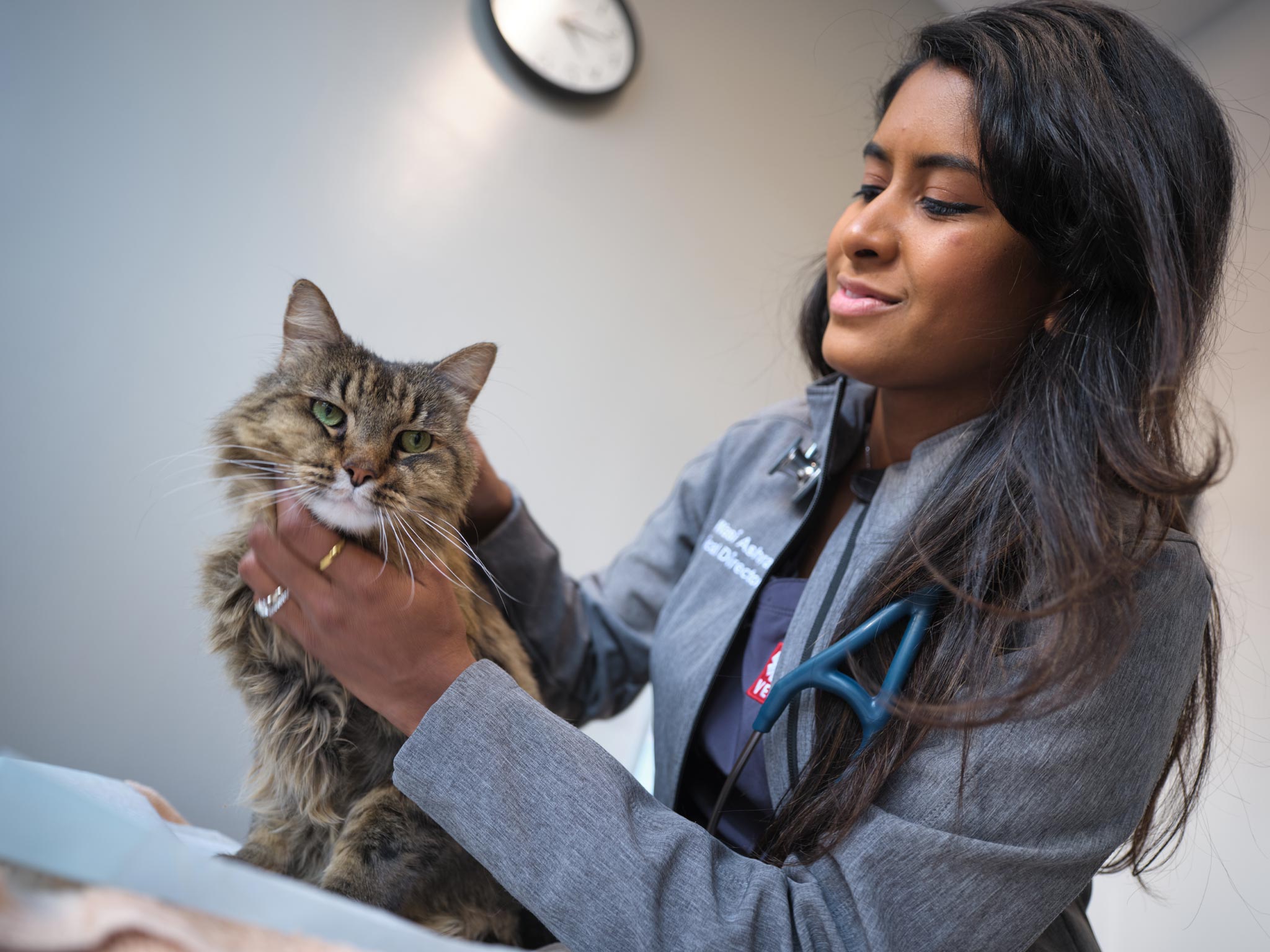
7 Common Pet Emergencies in Pittsburgh, PA
Veterinary Emergency Group
Call & Speak with a doctor Open 24/7, Even Holidays!
Walk in today for:
Emergencies
Point-of-Care Ultrasound
Urgent Care
X-Rays
Diagnostics + Testing
End-of-Life Care
Surgery
Treatment + Hospitalization
Within the Appalachian Mountains, lies the bustling city of Pittsburgh, PA. Within this thriving City of Bridges, pet owners have some hazards to watch out for, both common and unique to the area. Knowing how to recognize and respond to these emergencies can make all the difference in your pet’s outcome. Pittsburgh animal lovers, this blog will help you do just that!
Let’s discuss the seven most common pet emergencies we see at Veterinary Emergency Group (VEG) Pittsburgh. If you’re experiencing an animal emergency, call the 24-hour veterinary team at VEG Pittsburgh at (412) 690-0511. Add us to your contacts to save time in the event of an emergency.
Heads Up, Your Pet is in Distress
We’ll start with two symptoms that signal your pet is in distress and needs immediate vet care. Keeping an eye on your pet for any behavioral changes is key to getting them help when they need it.
1. Breathing difficulties
Breathe in, breathe out. Seems easy, but in cities, sometimes air quality isn’t the best and like humans, pets can be affected by it. There are other reasons your pet may have difficulty breathing, and they’re serious, like allergic reactions, a foreign object caught in the airway, or heart disease.
You’ll know your pet is having trouble breathing by any of these signs:
- Choking
- Heavy panting
- Inability to catch their breath
Call VEG Pittsburgh or come in and see a doctor right away if you see your pet is struggling to breathe.
2. Unusual lethargy or weakness
Your pet is usually Steel City strong but you see a sudden change in energy levels. If your pet is unusually lethargic, weak, or unable to stand, it could be a sign of an underlying health issue.
Look for:
- Disinterest in food or toys
- Extreme tiredness/sluggishness
- Inability to rouse (not wanting to get up from resting spot)
- Inability to stand
- Unresponsive to stimuli (sounds, touch, etc.)
Reasons for lethargy or weakness in your pet can range from toxin exposure to serious infections to organ failure. Seek immediate veterinary care at VEG.
Other Serious Cases We See in Our Pittsburgh Veterinary ER
3. Poisoning or Toxic Ingestion
Pittsburgh is home to various plants and substances that can be toxic to pets. Common culprits include:
- Certain foods, like that amazing chocolate you left on the countertop or xylitol, a chemical in some sugar-free products and peanut butters
- Household cleaners
- Toxic plants
Act fast and get immediate treatment if you suspect your pet has ingested something poisonous. Symptoms of poisoning can vary widely but often include:
- Diarrhea
- Drooling
- Seizures
- Vomiting
4. Trauma from Accidents or Falls
Look, you’re in a city. Drivers are distracted and the unimaginable can happen. Accidents, such as being hit by a car or experiencing a bad fall, are among the top reasons pets are rushed to our emergency animal care hospitals. If this happens, bring your pet to VEG Pittsburgh. No judgment, we know that accidents happen in an instant, even to the most responsible pet owners! So come on in and we’ll triage your pet immediately.
Check your pet out after an incident by looking for signs of trauma, which can include:
- Limping or not walking altogether
- Shock (some signs are weakness, rapid breathing, vomiting)
- Visible wounds
It’s vital to keep your pet calm and immobilized to prevent further injury and contact our Pittsburgh emergency hospital for pets for guidance.
5. Severe Vomiting or Diarrhea
Even your little buddy can get an upset belly from time to time. While occasional vomiting or diarrhea can occur in pets without being a big problem, persistent or severe episodes can indicate a serious health issue.
Repetitive vomiting or diarrhea can be a sign of:
- Gastrointestinal blockage
- Infections
- Other conditions requiring emergency veterinary intervention. Call VEG Pittsburgh and speak with a doctor right away
Seasonal Emergencies Pets Can Experience in the Burgh
6. Heatstroke
The Iron City experiences some hot summer heat! This can pose significant risks to pets, especially those that are older or brachycephalic (short-nosed breeds like pugs and bulldogs). Keep an eye on your pet in hot weather and look for signs of heatstroke:
- Collapse (in severe cases)
- Drooling
- Excessive panting
- Lethargy
Immediate cooling and veterinary care are crucial for an overheated pet’s outcome.
7. Cold Weather Risks
On the flipside, Pittsburgh’s cold winters bring risks of hypothermia and frostbite, particularly for pets with short coats. Look for signs of distress due to cold, like:
- Cold or pale skin
- Shivering
- Weakness
It’s so important to keep your pet cozy and warm indoors during freezing temps. Read more about winter emergencies here.
Preventing Pet Emergencies
You live in an amazing Pennsylvania city! Enjoy it with your pet, but always be on the lookout for things that can endanger your best pal. Ensuring your pet has a safe environment, avoiding toxic substances, and regular veterinary check-ups are key steps in emergency prevention. If your pet shows any signs of distress or any of the symptoms above, call VEG Pittsburgh at (412) 690-0511. Our expert veterinary staff is equipped to handle all types of pet emergencies, offering compassionate and expert care when your pet needs it most.

